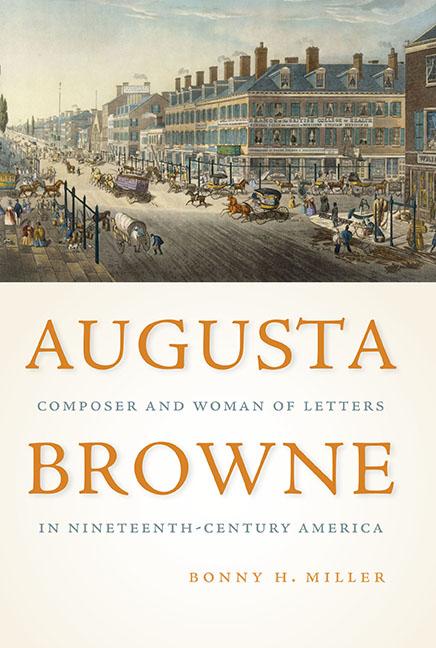Book contents
- Frontmatter
- Contents
- List of Illustrations
- Preface
- Acknowledgments
- Introduction
- 1 First Steps
- 2 Apprentice in a Family Music Business
- 3 Philadelphia Debut
- 4 A Young Professor of Music
- 5 A New Leaf
- 6 Her Own Woman
- 7 Courtship and Consequences
- 8 Pilgrim in Progress
- 9 “Glad Fruition”
- 10 Legacy in Music
- 11 Legacy in Literature
- 12 Contributions to Music Journalism
- 13 A Legacy Written into History
- Appendixes
- Appendixe 1 Children and Descendants of David Samuel Browne and Elizabeth Montgomery Browne
- Appendixe 2 Chronology of Augusta Browne’s Music and Letters
- Appendixe 3 List of Musical Works
- Appendix 4 Selected Glossary
- List of Abbreviations
- Notes
- Selected Bibliography
- Index
4 - A Young Professor of Music
Published online by Cambridge University Press: 23 October 2020
- Frontmatter
- Contents
- List of Illustrations
- Preface
- Acknowledgments
- Introduction
- 1 First Steps
- 2 Apprentice in a Family Music Business
- 3 Philadelphia Debut
- 4 A Young Professor of Music
- 5 A New Leaf
- 6 Her Own Woman
- 7 Courtship and Consequences
- 8 Pilgrim in Progress
- 9 “Glad Fruition”
- 10 Legacy in Music
- 11 Legacy in Literature
- 12 Contributions to Music Journalism
- 13 A Legacy Written into History
- Appendixes
- Appendixe 1 Children and Descendants of David Samuel Browne and Elizabeth Montgomery Browne
- Appendixe 2 Chronology of Augusta Browne’s Music and Letters
- Appendixe 3 List of Musical Works
- Appendix 4 Selected Glossary
- List of Abbreviations
- Notes
- Selected Bibliography
- Index
Summary
People, carts, horses, and wagons clogged the urban streets as hundreds of families simultaneously tried to transport their belongings to new rental lodgings, yet many New Yorkers moved yearly in quest of better quarters or lower rents. “Moving Day,” or the first day of May, was the date when annual rental leases traditionally began in the city and in Brooklyn. Walt Whitman called it “the annual hegira of householders,” and many authors described the crazy custom that was as much holiday as ordeal. An anonymous song deemed it “this City's curse,” and asked, “Is there a day on the records of the universe / More blent [blended] with smashing, crashing, breaking, and delay?” The chaos of Moving Day demanded weeks to restore order to people's lives and homes. The Brownes apparently braved the tidal surge of the event in 1841. A few weeks after Moving Day, the New York Tribune announced that on June 17, Mr. Browne, Mrs. Browne, and “Miss Browne” would begin “Music Tuition on Broadway.”
During the same month, Augusta Browne confidently advertised her services in the Protestant Vindicator “to churches inclined to engage a scientific Organist,” and printed the warm words of recommendation she had received from St. John's Lutheran Church in Philadelphia. Such a solicitation for a position as church organist was unique in the Vindicator, although announcements of musicians in search of church positions became commonplace in urban music periodicals during the 1850s. The Vindicator added, “This lady comes among us, recommended by the most distinguished amateurs of music in the City,” a notable endorsement after so short a time.
Newspaper advertisements during summer 1841 proclaimed the family's return to New York with a tone of upscale gentility:
Mr. and Mrs. Browne (with their daughter, Miss Augusta Browne), beg leave to announce to the Ladies of New York and its vicinity that, after several years’ absence, they have returned to this city to resume their Professional Practice, and have a taken a house at No. 700 Broadway, corner of Fourth street.
- Type
- Chapter
- Information
- Augusta BrowneComposer and Woman of Letters in Nineteenth-Century America, pp. 66 - 103Publisher: Boydell & BrewerPrint publication year: 2020

